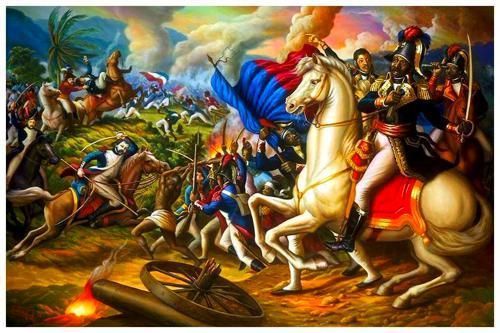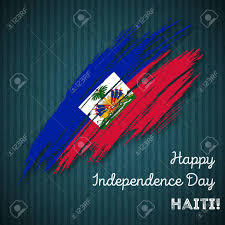#particularly at a time where we are seeing a massive political resurgence of anti-black and anti-brown racism
Explore tagged Tumblr posts
Text
haven't seen the wicked movie yet but will concede it's an extremely astute way for ariana grande to come out as white blonde
#like it was juuuuuuuuust getting to the point that the tide was turning there#where the risk of racefaking concerns finally being taken seriously by mainstream media outlets#was no longer outweighed by the advantages of being perceived as racially ambiguous in order to appeal to wider audiences#particularly at a time where we are seeing a massive political resurgence of anti-black and anti-brown racism#not really a coincidence that she chose now to go blonde/pale#amazing political acumen truly living up to Galinda's pragmatic example
720 notes
·
View notes
Text
What Haiti's past tells us about the meaning of Resistance & “Revolution”
One of the realities of American education (public or private) is that the already abbreviated history of Black people in the United States is completely non-intersectional and without recognition of the larger international African diaspora with respect to (1) Black liberation or (2) American and New-world European colonial history. For instance, it is not commonly recognized that proportionally-most Black people from Africa who arrived in the “New World” due to the Atlantic Slave Trade did not live in North America but in the Caribbean, South and Central America. That is to say, if you were enslaved (or newly freed) outside of Africa at any point from the 16th through late 19th century outside of Africa, you would’ve had a one in three (or four) chance of living in the United States. Ask your average Black person on the street about this and it’s news. Ask your average non-Black person on the street about this and it’s even more surprising news. And why wouldn’t it be? Due to highly racialized educational systems, steadfast commitment to Black marginalization, indifference and/or Black & indigenous marginalization, most Americans who don’t actively seek this information have very limited knowledge about critical historical events. The American Revolution and details are reduced to incoherent romanticized narratives about English tea and “tyranny”. The Civil War is also vague and obtuse in its descriptions of Southern animus and economics. “Reconstruction” is a word that, admittedly, I did not learn (or had forgotten about) until an adult...and as a young person I fancied myself more knowledgeable than most about Black History through extra-curricular history lessons, elders, activities and educated parents. Even I was unaware of the sequence of Black history, resistance and triumph on critical historical events in Black American history.
Fast forward to the 2016 Presidential Election, the word “Revolution” and phrase “We need a Revolution!” was flagrantly thrown around and abused in public discourse by young (and older) people who undoubtedly grew up with the same biased and negligent public educational system I had grown up with and (in many cases) profoundly less extra-curricular historical exposure and education. As a culture, we would then start to see real gains in the #BLM movement and the zeitgeist towards radical change and structural reforms from race to finance and public safety. I was quite happy to participate in the resurgence of a resistance movement, especially one centering itself around issues of Black liberation. It’s what I’ve been around most of my life. What I wasn’t comfortable with however, was the use of the term “revolution” to describe it. At least not by White people (there’s a reason for that) and/or by younger people (of any color/ethnicity) who also undoubtedly had been steeped in the vapid romanticism of ‘revolutionary’ history taught to us by our primary and secondary US educational indoctrinations.
I have been in formal activism and education personally 30+ years now. Make no mistake, I absolutely support of “change” in our society, particularly towards social justice and Black liberation. And I have no wish to exclude White people or any other ethnicity from being enthusiastic activists or communicators of social/economic/political justice. That’s not my point. What my case is however, is that I’ve always been uncomfortable with the careless use of the term “revolution” in our national political conversations about race, justice, history and radical change. Particularly if that term is being appropriated for something other than racial equality of Black or indigenous people in this country. Historically, “revolution” has been inextricably tied to some aspect of Black resistance in the new world. To update the term in a way that erases or obfuscates deep racial inequities makes me uncomfortable in its lack of this historical context. Aside from that appropriative term however, the use of the sub-category or phraseology “radical change” in connection with “revolution” is problematic for its own reasons; ‘radical change’ and ‘radical ideas’ have become erroneously conflated terms in this way. Historically speaking, radical ideas have always endured much longer than the actual moment of revolution and change itself. In my lifetime there have been a number of “radical” changes; cigarette use and public smoking, seatbelts, recycling, eco fuels, Black people being on television and not talking “jive”, Gay/Bi and Trans people simply existing while not living a sad, diseased-ridden and isolated life, smoking weed and pre-existing conditions in health care are all things which were massive structural changes in society that took lifetimes to negotiate, deconstruct and implement. The idea came way before the actual change. And every one of those ideas were not radically “changed” in any one moment or by any one person. Instead those changes represented a patchwork of efforts by nameless, thankless individuals, organizations and multiple leaders whose work at times overlapped in various ways. Many of whom died or had to leave their advocacy before their desired change could be realized. Simply saying “radical change” and/or conflating change with charismatic leaders, “revolution” and politicians without acknowledging radical ideas, radical people (plural) and radical efforts over long stretches of time is a betrayal of history, the people working to change and correct it and those who have worked to correct it, for our sake.
On this day, January 1st, 2021, the 217th anniversary of the dissolution of Saint Domingue and the beginning of Haiti (Áyitì), the very first ever Black republic in the European/Western colonial world, named in honor of-and deference to-the indigenous Arawak/Taino “Indians” of the Caribbean, the process of what change really looks like is as profound as it ever was. Most of us have not studied this history in any appreciable detail-Black people included. Many might be surprised to know that Haitians came to Philadelphia, Charleston (S.C.) and New Orleans as a direct result of what happened in the late 18th and early 19th century and that there are Black and White Americans living there right now with traceable ancestry to this Caribbean island and the revolution that occurred there (until earlier this year I wouldn’t have known that either). Despite what Kanye West said, Black people did not ‘choose’ inferiority, slavery and colonial oppression. In fact, they resisted it and plotted revolution from the moment they boarded ships in West Africa. Especially in places like Haiti where many of the Africans arriving were literally soldiers, prisoners of wars and being replenished every 5-7 years because of the high death and production rates. There were hundreds of rebellions and revolts of enslaved Africans in the New world during the Atlantic Slave Trade; Haiti’s is just one of many. But Haiti’s is the largest, sustained revolt, with the most cultural, political and economic implications for its White, Black/African & African descended people -and- as people living in a “new” world trying to reconcile what it means to live together in a land post-slavery, post-European colonialism. To this day its people are a living testament to how difficult that work of Anti-Black resistance is in a global economy built around the presumption and instance of Black inferiority. The “project” of this revolution is yet unfinished.
Therefore in 2021, anyone studying, protesting, manifesting and politically agitating against our current socio-economic-political structures in America needs to study the Haitian Revolution in as much detail as possible. It is one of the biggest examples of how intricate, dynamic, long-suffering and difficult it is to actually perform “radical change”. During the pandemic I began (re) introducing myself to this subject by reading books, watching documentaries and listening to lectures outlining the layers of narrative involved in what would be come the Haitian Revolution; Macandal, the three “Commissions”, the Tricolor Commission, “Declaration of the Rights of Man”, the determinative links of the French Revolution, “Code Noir”, André Rigoud, British blockades, Spanish regiments, the “Coloureds”, returns to the plantations for Africans only, not “Blacks”(e.g. caste systems), trade embargos, Toussaint, Dessalines, etc....all confirming what was already apparent: change is hard, long and often takes generations.
If you are currently fighting for something, or against it, know that not one person or one act can or will likely “radically” change the reality. A “revolution” is a term not to be used lightly. When we de-romanticize it and “dig” into it we can begin to see more clearly how ugly and non-inevitable it’s results truly are. History tells us so-and we can learn from this history in a way that informs our present-day activism and fight towards justice of any kind, for any person, any ethnicity. Commit yourself and learn from those who have done it before you and recognize that the past will always be relevant to the present in resistance and change.
Below are some great resources start to learning more on the Haitian Revolution👇🏿:
“Revolutions” (Apple Podcast, a immensely detailed lecture series!) https://podcasts.apple.com/us/podcast/revolutions/id703889772?i=1000358493623 PBS, “The Black Messiah: Macandal” https://youtu.be/cHIEYx2_C9Q “Haiti and the Atlantic World Reborn (New York Historical Society)” https://youtu.be/dpbLMkAJFtE “Noam Chomsky, Modern-Historical Political Commentary” https://youtu.be/e1JWr03P9W8 “Haiti Journal, 100th Anniversary of US Occupation” https://youtu.be/pILrdFJ683M
Happy New Year, Happy Haitian Independence Day and most importantly, Happy learning!!! 🤩🥂



#Haiti#Haitian Independence day#Macandal#Toussaint#L'overture#French Revolution#ayiti#Caribbean#afrocaribbean#caribbeanamerican#frenchcaribbean#American History#Revolution#Resistance#Activism#blm#blm protests#Haitian Occupation#noam chomsky#New York Historical Society#Documentary#revolutions podcast#atlantic slave trade#West Africa#Pearl of the Caribbean#saint domingue#Pirates#African Diaspora#Slavery#Black Republic
82 notes
·
View notes